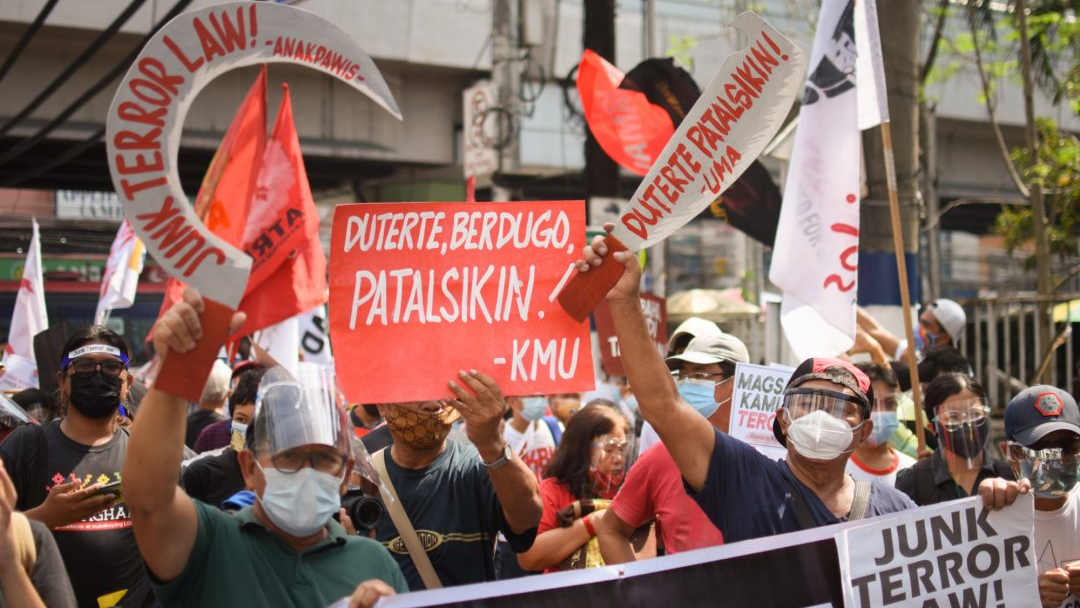Social movements and human rights groups in the Philippines have submitted a letter to the Supreme Court calling for improved protection to human rights lawyers and their clients. The joint letter addressed to chief justice Alexander Gesmundo was submitted on May 18 by Karapatan, Bagong Alyansang Makabayan (Bayan), Alliance of Concerned Teachers (ACT), Cordillera Peoples’ Alliance, Kilusang Mayo Uno (KMU), and the Confederation for Unity Recognition and Advance of Government Employees (COURAGE).
The letter specifically addressed the continued attacks on human rights advocates in the country, despite the previous condemnations and notifications passed by the apex court to lower courts and officials in March this year.
“Despite the Supreme Court’s much-needed statement two months ago, we are concerned that the attacks have only continued, if not worsened to even more alarming forms,” said Cristina Palabay, secretary general of Karapatan, one of the signatories of the petition. The letter argued that the attacks impede effective legal services by the lawyers to their clients, and also threatened the clients as well.
The letter comes after human rights lawyer and member of the National Union of People’s Lawyers (NUPL), Angelo Karlo Guillen, was stabbed earlier this week by two unidentified assailants in Iloilo City. It also pointed out that 147 bar members have been attacked under the Duterte regime. Of these, 84 were members of groups like NUPL, Public Interest Law Center, Union of People’s Lawyers in Mindanao, and the Free Legal Assistance Group.
The petitioners also alleged that the attacks were “state-sponsored” and should be seen in the context of the Rodrigo Duterte government’s counter-insurgency politics and targeting of social movements and activists.
“An urgent and decisive action from the Supreme Court is a matter of life and death for activists and human rights defenders especially now when we are being increasingly targeted in the government’s counterinsurgency and counter-terror campaign for our work and causes,” Palabay stated.
The petition also comes at a time when Filipino activists are still reeling from being in the list of “terrorists” published by the Anti-Terrorism Council (ATC), last week on May 13. The list with 19 names contains names of several peace activists, including jailed or exiled leaders of the banned Communist Party of the Philippines (CPP).
Social movements, lawyers and peace advocates have been warning of the impact it will have, and the repression it can entail. Many have also revived the concerns and questions regarding the controversial Anti-Terrorism Act (ATA) passed last year, in the middle of the pandemic, which authorizes actions of the ATC.
Renato Reyes Jr., secretary-general of Bayan, said that the terrorist tag is “worse than red-tagging” since it officially allows for the named individual to be persecuted with little to no evidence or even court sanctions.
“There was no due process basically. It is very dangerous not just for activists but for anyone,” said Reyes. The accused will have their assets frozen by the state and makes them susceptible to character assassination and attacks even before they reach a court trial. “Once you have a terrorist label on you, they can do many things. It is the most disturbing part, how it can be used to further attack peace consultants and other people the government deems undesirable,” he added.
Many have also responded to how the list parallels that of another anti-insurgency body’s targeting of activists. Palabay deemed the list to be a “copy-paste” of National Task Force to End Local Communist Armed Conflict’s (NTF-ELCAC) work, which is notorious and has been admonished by courts for red-tagging individuals.
Palabay pointed out that a similar list was released in 2018 by the Department of Justice naming over 649 individuals as “terrorists” under the Human Security Act. Even after court exoneration, seven of those named in the list have since been killed by unnamed assailants, including peace advocate Randy Malayao, peasant leader Randall Echanis, and human rights defender Zara Alvarez.
Some have also pointed out how the terror-tagging will adversely impact the peace process with the communists. The Philippine Ecumenical Peace Platform (PEPP), a coalition of various church-based groups advocating for peace and an end to the violence, warned in a statement of “far-reaching and adverse repercussions” on the dormant peace process between the government and the CPP.
The statement called for a peace “that is not just silencing the voices of dissent and the incarceration and destruction of lives that are defined as terrorists. But a peace that addresses the root causes of dissent and seeks resolution by negotiation.”
The people named as terrorists by the ATC also include peace activists who have been working towards reviving the peace process between the government and the communist insurgents. Several of the activists named are still working legally and have previously been “red-tagged” by government officials, prompting attacks and persecution.
One of the activists named is a petitioner in the Anti-Terrorism Act case being tried in the Supreme Court. “That is the very essence of the resolution that maliciously jumps the gun on the ongoing Supreme Court deliberations in order to sideswipe the final determination of the patent unconstitutionality of the Anti-Terrorism Act,” said Fides Lim, wife of long-time political prisoner, Vincente Ladlad, and one of the peace activists named as terrorist by the ATC, even as his case is being tried in the court.
With inputs from reports by Bulatlat





